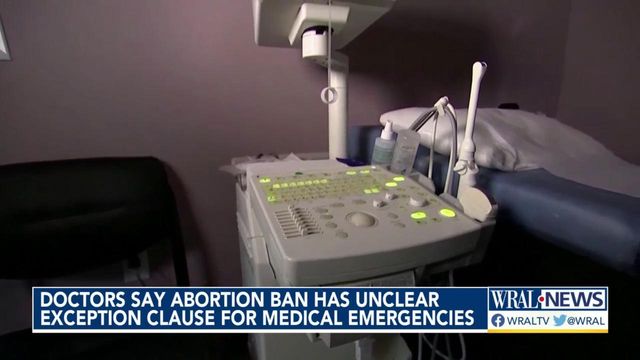NC abortion law exceptions too vague, critics say
The state's 20-week abortion ban includes a narrowly-drawn exception for medical emergency. Critics say the exception is too vague, and will lead to poorer care for patients with pregnancy complications.
Posted — UpdatedCritics of the law say its medical emergency exception is vague, possibly unenforceable, and they warn it will lead to poorer care for patients with pregnancy complications.
Beginning in 1967, state law included an exception permitting abortion in a the case of a medical emergency, which was defined at the time as "substantial risk that the continuance of the pregnancy would threaten the life or gravely impair the health of the woman.”
"A condition which, in reasonable medical judgment, so complicates the medical condition of the pregnant woman as to necessitate the immediate abortion of her pregnancy to avert her death or for which a delay will create serious risk of substantial and irreversible physical impairment of a major bodily function, not including any psychological or emotional conditions."
Doctors who violate the current law are subject to felony charges that can carry a 10-year prison sentence. North Carolina law also makes them liable for civil damages sought by patients or their family members.
Professor Meghan Boone teaches reproductive and family law at Wake Forest University. Boone said the state law was challenged in 2016 in Bryant v Woodall, a case in which several doctors and reproductive health care group Planned Parenthood argued in part that the definition of a medical emergency was void for vagueness.
"It puts healthcare providers in the unenviable position of trying to decide just how sick a pregnant person has to be before they're legally allowed to act," Boone told WRAL News. "Any reasonable doctor faced with the possibility of up to 10 years in prison is going to be extremely reluctant to provide care unless the medical emergency is very, very clear. But, as anyone who has ever had sort of any sort of medical emergency emergency in their life can say, it's often not 100% clear."
"There's a real risk of inconsistent and discriminatory enforcement if the people charged with enforcing the laws," Boone added. "The police and the prosecutors also have their own views about what counts and doesn't for medical emergencies."
Duke University School of Medicine OB/GYN Dr. Beverly Gray was one of the doctors who filed the challenge in 2016. She sees patients in that post-20 week window at her clinic in Durham.
Gray said abortions between 20 weeks and viability make up less than 1% of all abortions in the state. Many of those are challenging cases involving maternal health and pregnancy complications. For example, she said, lupus and rheumatic arthritis can worsen as a pregnancy develops.
"They may not have a flare of their illness until they're further along in the pregnancy," Gray said. "So they start developing kidney failure. But is that enough? Is the kidney failure severe enough? Do they have to be on dialysis? It's just unclear.
"When you wait for someone to be sick enough, that really puts their lives at risk, and pushes them further into their pregnancy. It puts them at further risk of complications."
Gray said anatomical ultrasounds are generally done at 18 weeks in North Carolina. That's usually when fetal abnormalities or defects are diagnosed. She said that leaves a very short window for patients to make what can be an incredibly difficult decision.
"And then if they want to have further studies, like an amniocentesis or other information, they're really on the clock," Gray said. "I would say a lot of patients that end up being referred out of state are patients that want to make a thoughtful decision with their family, with their faith leaders, with their doctors."
Even if the fetus develops "lethal birth defects," those that are incompatible with life, Gray said the state's medical exception for abortion after 20 weeks would not apply unless the defect is endangering the mother's life.
"They don't fall under any medical exemption, even though they are carrying a pregnancy with lethal birth defects. They can't have care in our state in that window, so we have to refer them elsewhere for care," Gray said, noting that some patients cannot afford to travel out of state.
Asked how lawmakers could change the law to make it more protective for patients, both Gray and Boone said they don't believe lawmakers ought to be weighing in on the issue at all.
"We should let doctors and medical associations promulgate those sorts of guidelines," Boone said. "And thankfully, that sort of guidance already exists, right? Doctors are already operating under standards of care and understandings of medical risk and probability. I just don't think that legislatures are ever going to be able to do that job effectively."
State lawmakers could revisit the definition next session. Republican House and Senate leaders have already said they plan to take up abortion legislation in 2023, when they're hoping to have won a veto-proof majority in the statehouse.
• Credits
Copyright 2024 by Capitol Broadcasting Company. All rights reserved. This material may not be published, broadcast, rewritten or redistributed.






